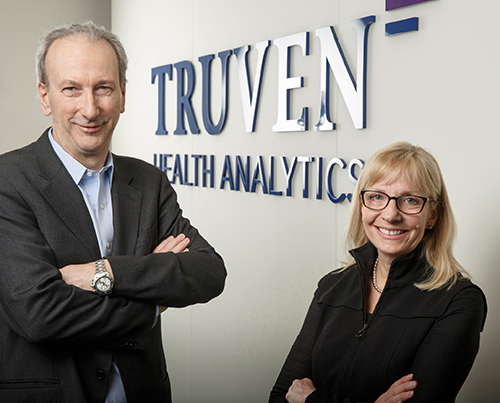IBM Health’s data combined with Truven’s patient records will create an enormous big-data collection representing 300 million patient lives
If any pathologist or clinical laboratory manager still doubts the importance of healthcare big data, the multi-billion-dollar acquisition of Truven Health Analytics by IBM should put those doubts to rest.
Last month, IBM Corp. (NYSE:IBM) announced an agreement to acquire Truven Health Analytics, (Truven) for $2.6 billion. Truven is a provider of cloud-based healthcare, analytics, and insights and is based in Ann Arbor, Michigan.
IBM to Merge Watson Health Data with Truven’s Patient Records
One interesting aspect to this acquisition involves IBM’s plans to merge Truven’s patient records with the database maintained by IBM’s Watson Health. IBM said that, post-acquisition, it will have one of the world’s largest and most diverse collections of health data within IBM Watson Health. Watson Health currently delivers these cloud-based services:
• Analysis of data;
• Interpretation of complex questions; and
• Evidence-based answers to doctors, research, insurers, and others.
Also, the huge investment—IBM’s fourth health acquisition since establishing Watson Health in April 2015—confirms big data’s power in the healthcare industry, particularly as healthcare is poised to move from fee-for-service reimbursement to value-based schemes such as bundled payments.
IBM’s Motivation
Truven has achieved considerable market penetration. Experts estimate that Truven’s data and insights inform clinical decision-making for one in three Americans. Analysts believe that, once the acquisition of Truven is completed, Watson Health’s data repository will house health data representing an aggregate of about 300 million patient data sets or “lives.” This new treasure trove of data will be comprised of Watson Health’s 100 million data assets and Truven’s 200 million lives, explained an article in the Wall Street Journal (WSJ).
“Our goal was to enter the healthcare industry in a big way and try to be a contributor to better outcomes at lower costs. This is such a rich data set. This is going to be a goldmine of insights,” said John Kelly, IBM Senior Vice President, Cognitive Solutions and Research, in a Forbes article.
Customer acquisition may also be a motivating factor. Truven will provide IBM with access to more than 8,500 clients—hospitals, insurers, government agencies, employers, clinicians, and life science companies.
Medical laboratories, as coordinators of diagnostics information, have valuable assets to offer as well, as big data is leveraged by providers and other stakeholders aiming to control costs and improve patient care.

John Kelly, PhD (above), is IBM’s Senior Vice President of Cognitive Solutions and IBM Research. In a New York Times article, Kelly said that the “Truven acquisition rounds out the range of data assets and data management capabilities in healthcare that IBM had in mind when it established the Watson Health unit. Truven contributes vital payment information on patients. And payment records include detailed coding on disease types, diagnosis, drugs prescribed, and clues to outcomes if, say, a patient does not respond to one treatment and is given another. It’s a very key cog to give us one of the most complete data sets on patients and healthcare in the world.” (Photo copyright: Advanced Energy Center (AERTC), Stony Brook University.)
The Build of a Healthcare Big Data Database
The purchase of Truven from its owner Veritas Capital represents IBM’s biggest deal within the past year for its Watson Health business unit. The idea is to integrate over time Truven’s cloud-based data set—spanning hundreds of different types of cost, claims, quality, and outcomes information—with existing Watson Health data sets.
The acquisition will double the size of Watson Health’s human resources to 5,000 employees, noted Forbes.
Once the acquisition of Truven closes, IBM’s investment in health-related technology and data providers—aimed at building cognitive healthcare capabilities—will total more than $4 billion.
“Most of the data in healthcare is in disparate databases,” stated Deborah DiSanzo, Watson Health’s General Manager. “The strategy of IBM is to bring together and democratize it so that both IBM and our ecosystem of partners can build health solutions on top of it.” She was quoted in an article in Tech Times.
“Areas in healthcare are converging around value-based healthcare delivery. As part of Watson Health, we will be able to far more effectively contribute to how those changes are implemented,” said Mike Boswood, CEO, Truven Health Analytics, in a Bloomberg article.

Mike Boswood (left), Truven Health Analytics’ CEO, and Deborah DiSanzo (right), Watson Health’s General Manager, are planning for IBM Watson Health’s acquisition of Truven for $2.6 billion later this year. Truven’s cloud-based technology, methodologies, and health claims data will be integrated into the Watson Health cloud over time, creating one of the world’s largest health-related data collections representing 300 million patient lives. (Photo credit/copyright: John Gress/Feature Photo Service for IBM/New York Times.)
Other Big-Data Deals in the Works
Watson Health’s anticipated acquisition of Truven is not the only deal with big data as its focal point. Dark Daily also recently reported on Cardinal Health’s acquiring 71% interest in naviHealth, a company that partners with health plans and providers to manage post-acute care by leveraging technology and analytics.
We also explored Mayo Clinic’s outreach to OptumLabs.The huge OptumLabs data set is being tapped by Mayo Clinic for research on diabetes management by more than two million people with type 2 diabetes. (See Dark Daily, “When it Comes to Mining Healthcare Big Data Including Medical Laboratory Tests, Optum Labs is the Company to Watch,” December 14, 2015.)
Still other Dark Daily briefings detailed results healthcare systems are already seeing from big-data projects.
For example, Pennsylvania Health System’s big-data project, dubbed Penn Signals, relies on lab data and three million patient records over 10 years. It is yielding results in a sepsis early warning system and raising caregivers’ ability to detect patients who are trending toward heart failure, according to our report earlier this year. (See Dark Daily, “Penn Medicine Informatics Taps Medical Laboratory Data and Three Million Patient Records Over 10 Years to Evaluate Sepsis Risk and Head-Off Heart Failure,” February 26, 2016.)
Pathologists and laboratory leaders have important roles to fulfill as big data and analytics continue to drive healthcare business and clinical decisions. And, as new reimbursement schemes take hold and personalized medicine grows, medical laboratory data may one day be priceless as clinicians strive to improve patient outcomes and reduce the cost of healthcare.
—Donna Marie Pocius
Related Information:
IBM to Buy Truven Health Analytics for $2.6 Billion
IBM Buys Truven for $2.6 Billion, Adding to Trove of Patient Data
IBM Watson to Buy Truven Health for $2.6 Billion, Bolsters Data Cloud
IBM Acquires Truven Health Analytics; Here’s Why It’s Spending $2.6B
IBM Buying Truven for $2.6 Billion to Amass More Health Data



